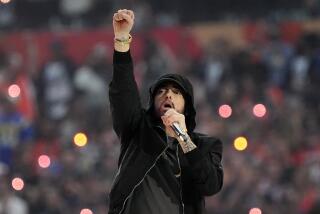Eminem Takes the Rap in Britain
- Share via
LONDON — Eminem is nothing if not rude, and Britain, of course, is the motherland of good manners, so it was probably never going to be an easy relationship.
The 26-year-old white rapper’s previous British tours raised a few eyebrows, but in the wake of his phenomenal success--a 10-million-selling album, “The Marshall Mathers LP,” and four Grammy nominations--the prospect of his three-day blitz this week is making Britons stand up and take notice.
In Manchester, where he is scheduled to appear Thursday, the City Council has announced that the recording artist will be permitted to have a chain saw on stage, as he is wont to do, but that health and safety regulations require that it be switched off.
A polite warning if ever there was one.
The Sheffield University student union, on the other hand, has taken a harder line. The students in northern England have banned the rapper’s anti-women, anti-gay lyrics from their radio station, reviews of his music from their newspaper and Eminem T-shirts from their discos.
“Our aim is to create a culture of tolerance, equality and respect for our members,” a union representative said last week. “We have an anti-homophobic policy, and we are working toward that.”
Unfortunately, the culture of tolerance is putting the radio station between rap and a hard place: A disc jockey there says that if staffers defy the ban and play the music, the student union may cut the station’s funding, but if they do not play the music, radio authorities may take away their license for failure to be impartial in their choice of music.
The Sheffield ban was condemned by both conservative and liberal newspapers, with the Daily Telegraph calling it a “wonderful example of the loony left wing” and the Independent saying it “continued the tradition of student illiberalism.”
“Take him or leave him, but do not get wound up by him: The more he shocks, the more he sells,” the Independent said in an editorial Saturday.
“His lyrics are loaded with fantasies of murder and violence. . . . This is pretty unpalatable stuff,” the Guardian said. “But the union’s stand is futile. . . . Given that his unique selling point is his notoriety, the union has simply given acres of free promotions to the press ahead of his arrival.”
The media attention has not made the angry, anti-gay “misogynist,” as even his wife has called him, more popular with gay activists. Although Elton John, one of Britain’s leading gay artists, has said Eminem is a genius, British gay groups promise to “welcome” the rap singer at Heathrow Airport in much the same way the U.S. Rally Against Hate proposes to greet him at the Grammy Awards on Feb. 21--with protests.
Nor does the raunchy publicity--complete with photographs of Eminem flashing his middle finger at the world--seem to be winning over young British women.
“Personally, I think his music’s terrible, like a kid being rebellious,” said Abi Harding, 20, an anthropology student at University College London. “But any student union banning an Eminem song is quite pedantic. It’s over the top. We’re all adults, and we can all decide what we take on or don’t take on.”
Harding dismisses Eminem as “a minor factor” and “not very genuine.”
Daily Telegraph critic Neil McCormick disagrees, saying Eminem is the real thing.
McCormick wrote Saturday that Eminem “relentlessly attacks the hypocrisy of American values, picking out all the worst excesses of that dysfunctional soap-operatic world where . . . the president himself has been caught with his pants down.”
Guardian columnist Gary Younge, on the other hand, is not amused.
One of Britain’s two black columnists, Younge notes that Eminem never uses the “N-word,” apparently to avoid offending blacks, who after all invented rap music.
“The trouble is not that Eminem is amoral, ignorant or naive. It is that his morality, intelligence and savvy rarely extend to the dignity of women and gay people, many of whom, incidentally, are black,” Younge wrote.
For Younge, the problem with Sheffield’s ban is that it is selective.
“If misogyny is grounds for banning music, then why start with Eminem? How about Tom Jones’ ‘Delilah,’ about a man who stabs his former lover in cold blood. . . . Or the Rolling Stones’ ‘Brown Sugar,’ which sings gleefully about a black slave woman being beaten and raped by her owner,” he wrote.
“So long as men have had tongues in their heads, some of them have used their voices to damn women and often have been paid handsomely for it. So banal is their bigotry that we can sing along for years to these songs without noticing,” Younge added. “It is the way in which we have allowed bigotry to seep into so much popular music that is the problem; Eminem is just one more symptom.”
The criticism of the singer is likely to grow after he hits town this week with the “Texas Chainsaw Massacre” act he took to Germany. Not as courteous as Manchester, London police have warned that he will be arrested if he repeats the performance.
“His fans believe that nothing would delight the rapper more than the arrival of the boys in blue on his lavish stage set,” the Daily Mail reported. “It would simply add to the sense of occasion--and, as any rapper worth his rhyming couplets knows, that is an art in itself.”
In its news pages Saturday, the Independent noted that an inquest in Devon last month was told that Eminem fan David Hurcombe, 17, had killed himself after writing a suicide note that included lyrics from the rapper. Hurcombe threw himself in front of a train after copying out some words and adding, “Anyway, got to go, miss my train, see y’all in hell.”
More to Read
The biggest entertainment stories
Get our big stories about Hollywood, film, television, music, arts, culture and more right in your inbox as soon as they publish.
You may occasionally receive promotional content from the Los Angeles Times.










